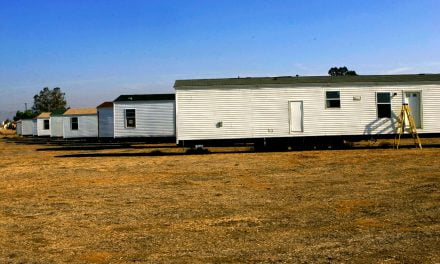Welcome to the “review edition” of the Department of Real Estate (DRE)’s quarterly bulletin, where the agency is using its past to think about the future.
Going on 100
The bulletin’s theme is not without good reason — this year, the DRE celebrates the centennial of the 1919 Realty Act, a landmark piece of legislation that brought the first form of the DRE into existence.
Acting Commissioner Daniel Sandri, the retrospective’s author, frames the anniversary in terms of the DRE’s primary stated goal: consumer protection. The establishment of a department to oversee California real estate brought licensure and regulation to the forefront of the industry, to make sure agents and brokers operated with a consistent level of integrity and professionalism.
The DRE’s laudable goal might be aided with a dedicated code of ethics that applies to all licensees, but that’s just the opinion of one publication. We hope the department continues to put consumer protection front and center!
Related article:
https://journal.firsttuesday.us/resurrect-the-dres-code-of-ethics-taking-a-closer-look/64595/
The annual report
The rest of the bulletin is dedicated to the DRE’s yearly progress report.
This overview begins with the Audit Section, here including one of the DRE’s reminders about trust fund violations. If these reminders seem endless, it’s largely because the violations seem that way as well — from the nearly 500 investigative and proactive audits the DRE conducted in the 2018-2019 fiscal year, the DRE found more than $8.8 million in trust fund shortages. Most of the offenders were brokers involved in property management and escrow activities.
Related article:
https://journal.firsttuesday.us/brokerage-reminder-trust-fundamentals/45457/
Technology marches on
Last time we talked about the DRE’s information technology goals, in the Fall 2018 Bulletin Digest, some of its priorities were still theoretical. By now, the DRE is well on its way toward heading into the 21st century by means of systems like:
- the Subdivisions Online Public Report Application System (SOPRAS), an online submission system for public subdivision reports to the DRE;
- Voice over Internet Protocol (VoIP) conversion for the DRE’s phone system; and
- Interactive Voice Response (IVR), in order to handle processing the high volume of calls received by the DRE.
The DRE is also further expanding their eLicensing system. Broker-associates may now affiliate their license with a responsible broker using the DRE’s online portal.
Related article:
https://journal.firsttuesday.us/your-guide-to-the-calbres-online-elicensing-system/53800/
A show of force
The department went relatively in depth on the workings of the enforcement section in their Fall 2018 bulletin, but they do so again here.
The Enforcement section investigates written complaints filed against licensees, subdividers and unlicensed individuals where real estate transactions are at issue. The section only investigates potential violations of either the Real Estate Law or Subdivided Lands Law. When the Enforcement section determines the evidence points to a violation, the DRE’s Legal section takes it from there with a recommendation for disciplinary action.
In the 2018-2019 fiscal year, over 1,000 cases necessitated disciplinary action, about a sixth of all those the Enforcement section investigated.
Related article:
https://journal.firsttuesday.us/dre-hot-seat-failure-to-report-a-criminal-conviction/69165/
Recently, the Enforcement section has also focused on proactive measures such as broker office surveys and meetings with local licensee associations.
The Legal section also manages the Consumer Recovery Fund, an invaluable resource which compensates victims of real estate fraud. Over the course of the fiscal year, the fund paid out 68 claims coming out to over $3 million.
Subdivide and conquer
The Subdivision section oversees public reports, permits and registrations for subdivisions marketed in California, putting consumer protection front and center by shielding buyers from fraud and misleading marketing.
In the 2018-2019 fiscal year, the DRE received just over 3,000 public report applications. Although this is just down from the previous year, it’s well above the average in the last 15 years.
Going forward, the Subdivision section is all about disseminating critical information to consumers, especially awareness of real estate fraud, by beefing up the amount of educational material posted on the DRE’s website, among other methods.
More MLA for MLOs
The Mortgage Loan Activities (MLA) unit exists under the enforcement section, where it deals primarily with mortgage loan originators (MLOs). Over the course of the fiscal year, MLA has:
- performed 227 background investigations;
- overseen a total of 468 brokers required to submitted quarterly and annual reports to the DRE; and
- responded to around 2,500 calls and letters requesting information about MLO compliance.
Editor’s note — first tuesday offers a comprehensive 8-hour NMLS continuing education course for MLOs.
Licensed to license
The number of both salesperson and broker exam applicants decreased slightly over the last year. However, renewals have been relatively level, including MLO license renewals.
Related article:
https://journal.firsttuesday.us/new-sales-agent-license-renewals-flatten/61492/
In that time period, the Licensing Background Review Unit (LBRU), which performs applicant background checks for the issuance or denial of real estate licenses, referred 777 applicants to the Enforcement section, out of around 2,500 that were flagged for further review.
The Licensing section also handles a large number of the phone calls fielded by the DRE. Even with the implementation of a virtual contact center (VCC) in December 2018, just over half of the over 300,000 calls the DRE received last fiscal year were taken by the licensing staff.
In addition, the Licensing section has been busy consulting industry practitioners in an “examination validation study” designed to make sure the license exams produced by the DRE accurately reflect the practice of California real estate. On top of which the Education and Research unit operating in the Licensing section has been busy approving statutory and continuing education courses for real estate licensees.
Editor’s note — first Tuesday is a DRE-approved course provider of both statutory licensing courses and 45-hour continuing education.
In the future, the DRE hopes to further update its eLicensing system to allow exam applications to be submitted online. This is a step in the right direction, but just as helpful to many prospective licensees would be the ability to submit license applications through the eLicensing portal, an update first tuesday has long lobbied for.
Closing remarks
This lengthy edition of the DRE’s quarterly bulletin ends with a reminder of the 2018 federal Economic Growth, Regulatory Relief, and Consumer Protection Act. This legislation allows certain MLO applicants temporary authority to operate as MLOs before the endorsement of their license.
The DRE also wishes to remind us that all MLO endorsement applicants first need to hold a valid real estate license — all applicants without one will be denied an endorsement, as well as the authority granted under recent federal legislation.
In addition, this bulletin includes the DRE’s financial statement from the 2018-2019 fiscal year. To check that out, along with the department’s full report on all their comings and goings, click here.
And with that, we’ll see you when the winter bulletin rolls around!














